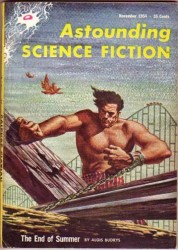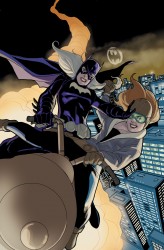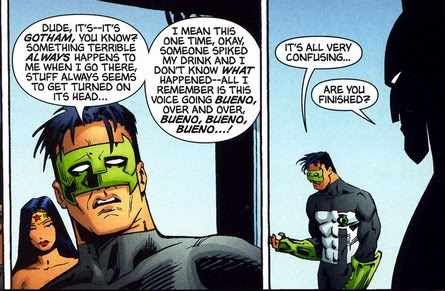
New io9 Post
November 15th, 2009 Posted by Esther Inglis-ArkellNovember 2009 looks back on November 1954, as I take apart an issue of Astounding Science Fiction at io9.


November 2009 looks back on November 1954, as I take apart an issue of Astounding Science Fiction at io9.


Let’s start this review with a look at Batgirl #7. What’s that you say? It’s only issue four? I don’t care. We need to look at this awesomeness.

Now, to issue four.

Let’s say you’re reading the editorial on a comic, or an interview with a comics professional, or maybe just scanning the solicits for upcoming comics, and you see something that seems a little off.
Something a little inappropriate; both gruesome and coy. Something that hints at terrible, momentous events but is played off as a detail.
Something, in other words, that is guaranteed to get the serious and touchy fans burning up their keyboards. And that is, kind of, the point. (Or part of it. The other part is the fact that comics professionals don’t take comics quite as seriously as fans – and a good thing, too, considering many of them work in close proximity and have sharpened pencils on hand.) Interviews and editorials are meant to garner publicity, and unhappiness usually shouts louder than contentment. Especially on the internet.
That’s where you get to the problem with shouting your unhappiness with this prospective storyline; it’s kind of like giving a kid a candy bar every time they throw a tantrum. In time you will end up with a toothless, tantrum-prone child and a shortage of snicker bars and an alcohol problem. I may be stretching the metaphor.
My point is, though, how does one criticize a company’s choices in a business where almost any publicity is good publicity? Because the only way I can see turning these things to my advantage is telling you guys that clicking the ads on this site registers a formal complaint.

Okay, and this Chad fellow, too. For those of you unwilling to scroll down two entries, I’ll re-post David’s entry in full:
Chad Nevett on New Avengers #58:
Yeah, here’s the thing: not killing bad guys doesn’t make you better than them, it makes you a fucking pussy. It makes you responsible for everything negative they do after that point. No grey areas, no moral questions, no debates about what’s heroic and what’s not. […] I hate superhero comics for pretending that letting villains live is somehow the morally superior thing to do, because it’s not.
If you listened to the Fourcast! this week, and you should have, you’d know that I agree with every word Chad says. I wanted to have a longer excerpt, but it’s a pretty short review. Go read it.
Chad and David both seem to agree that in comics heroes should be able to occasionally kill villains. I agree, with specific exceptions, with this general idea.
Where we differ crucially is what ‘killing’ means. To quote Chad:
Should they kill every mugger ala the Punisher? No. Should they kill Norman Osborn when the chance arises? Um, yeah.
‘Killing’ someone encompases a variety of different concepts, from pre-planned murder to accidental manslaughter to legitimate self-defense. I think that, if the situation were to arise in which a hero had to kill a villain in order to save the life of that villain’s intended victim, they should, morally, kill the villain. That’s killing someone.
Killing Norman Osborn, or the Joker, or whoever else, when ‘the chance arises’ is not just killing someone. That’s an execution. There is a very distinct meaning to that, and there are very different consequences for it. Read the rest of this entry �


The character responsible for Kyle disgusted lip-curl is Bueno Excellente, Garth Ennis’s Section 8character. Bueno overcomes evil with the power of perversion. Seriously. A drugged sexual encounter between Kyle and Bueno is implied (although it is possible that Bueno managed to save Kyle), in the above panels. Some people have said that, whichever scenario is implied, the above panels are a rape joke, and would have an effect of Kyle’s character. Other people say that it was just a joke and not part of continuity.
(There’s also a ‘just a joke’ argument versus an ‘offensive’ argument. Since that always comes up, I’ll briefly summarize my thoughts on the matter. Phrasing something humorously doesn’t mean the central concept isn’t offensive, and if someone is tough enough to make jokes about sensitive subjects, they should be tough enough to take criticism.)
I haven’t seen Bueno in action, so I don’t know if the moment is out of character for him, but I imagine that this was just meant as a funny shout-out to another comic book, and not an important part of either character’s history. (Unless Grant Morrison gets hold of it in 30 years. Then it will be the basis for several whodunnit-type story-arcs.) There are other moments scattered through comics that do the same thing.
Much was made of the Tamora Pierce (Edit: Jodi Picoult was the actual writer. Thank you David Uzumeri.) Wonder Womanissue in which Wondy dropped an injured man she was carrying when he made a lascivious remark about her. It was supposed to be a humorous beat, but many readers pointed out that it was an out-of-character move for Wonder Woman that could have had serious consequences.
Savant and Creote were introduced in Birds of Prey. Savant was a computer genius who had no ability to judge time; he wouldn’t know if he had done something yesterday or a decade ago. Creote was a Russian ultra-thug who, it was revealed, was gay and in love with Savant. They were bad guys who were semi-redeemed over about forty issues, and then left the story. About ten issues later, when the Birds need someone they can trust to take car of a young girl, Creote turned up in an apron with a feather duster under one arm, oven mitts on both hands and balancing what looked like a casserole dish. The panel was a funny image, but Creote was established as a glowering tough guy who was indifferent to his surroundings; indifferent, in fact, to everything that wasn’t Savant.
Obviously, the skill, timing, and context of these moments influence how people take them, but so does personal taste. Some people don’t mind a little out-of-character wackiness if it’s in service of an overall humorous tone. Others don’t think its funny if it doesn’t feel right for the character.

Say what you want about Dollhouse, it makes a compelling case for giving Bruce Lee the Nobel Prize for Medicine posthumously. There is very little in the human body, mind, or soul that this series hasn’t cured with a good hit to the brain-pan.
First of all, any soon-to-be parents can throw out those namby-pamby parenting manuals that tell them to spare the rod. In the pilot, the ‘hero’ of the series is introduced via boxing montage. As he is pummelled mercilessly, his fight is intersperced with scenes of his superiors telling him to back off investigating the Dollhouse. After he is beaten to the ground, he gets up to fight once more! That’s right. You can smack determination into your kids. Do it early. Do it often.
Of course, this might get them feeling a little down. No problem. You know what cures suicidal tendencies? A hit with a chair. Yes, in episode three, a suicidal pop star is ‘cured’ of her tendencies by being cracked with a folding chair, wrestlemania-style. No, I’m not kidding. It wasn’t subtext. It wasn’t a post hoc, ergo propter hoc situation. They actually said, on the show, that a ‘brush with death’ helped reignite her desire to live.
But those are just mental conditions, right? Mental problems are cured in all kinds of strange ways. Physical problems, however, well – they take something a little more specialized.
Or not. Four episodes into the series, an evangelical preacher actually beats the blindness out of the main character. All right, so he only dislodged a chip in her head, allowing her to see. That, however, was just an open-handed slap. Imagine what a fist could do.
We only get to see that miracle cure in season two, but let me tell you, readers, it was worth the wait. In the first episode of season two, we see the boxing-ring hero call on all of his experience and actually beat martial arts ability into the heroine. On the way, he probably went through the ability to horseback ride, speak other languages, and work as a trained nurse, because she was glitching between multiple personalities until she was smacked into one who could kill all the arms dealers who were surrounding the both of them.
Regardless of the situation, I think that Dollhouse has showed us the way to true health. Forget vegetables and meditation. Find yourself a wall and whack it with your head. You’ll thank me when you’re a ninja.

I was thinking today about Diana and Stephanie, the two female characters whose comics I buy. Diana, Wonder Woman, is perfect. The embodiment of compassion, strength, honor, bravery, and beauty, she’s a princess and a warrior and an ambassador. Despite her iconic status, and the fact that she’s had an ongoing comic for the better part of a century, female fan interest in her has only recently heated up – due to Gail Simone’s decision to write her comic.
Stephanie, Spoiler/Robin/Batgirl/Who’sNext?, is decidedly not perfect. A perpetual screw-up, she’s earned both my and general female fandom’s accolades by picking herself up, dusting herself off, and starting all over again. It’s possible that her moment of greatest popularity was after her death.
While it’s normal for fans of any gender to decry a comics character’s death while pretty much ignoring their life, I wonder if something extra is at work, here, especially when I think of other media. Most TV shows and movies about female characters are about the adorable main character trying to get her life together. She’s clumsy, and awkward, but tries so hard.
And she’s at war, usually, with the ultra-perfect glamazon who is after her job/man/scholarship/position in society/what’s next? I hate that dynamic because it has always been, in my experience, false. What’s more, it embraces the values it supposedly abhors. Whether it favors the popular girl or the outsider (And who are we kidding? Like any show, book or movie in the last fifty years hasn’t sung the praises of the noble outsider), it still villifies one segment of the population for, basically, having different values, tastes or interests. Still, I wonder if, no matter how I resist it, it’s at work in me, or at work in many women.
While media that sings the praises of the powerful man (The Sopranos, The Tudors, Kings, etc.), the brilliant man (Law & Order: Criminal Intent, CSI Miami, House, Monk), or simply the eccenric or egotistical man (Dexter, House again, Nip/Tuck) do well, women are always given a heroine they can relate to not one that they feel they have to compete with, and certainly not one they feel they’d lose out to.
Even in shows like Buffy the Vampire Slayer, the heroine is usual beset with troubles and struggling, instead of blowing everyone away with her strength and brilliance. Buffy, the mystical chosen one, is always one step away from getting kicked out of school. House, the doctor who can’t be assed to restrain his own bad behavior, finds out that his supervisor has budgeted in lawsuit money for the various patients who sue him because he is just that good.
Is this about what’s offered to women? Is it about what’s taught? (Tina Fey’s movie, Mean Girls, was hailed as an insightful satire about teenage girls. It had a group called ‘The Plastics’. We never had groups like that in my school, but how many movies can you watch before you develop an attitude of ‘it’s us versus them’.) Is it just my lopsided view of pop-culture?
In the end, girls and women are given many examples of heroines about winning out when odds are against them (just as men are) but relatively few examples of just plain winners.


If you’ve been reading for a while, you know that I like my comics to be more variety show than epic tale. Although there are a few long stories I adore, most of which I’ve gone on about already, there is nothing I like better than an eclectic bunch of simple stories. Gotham Knights, Superman/Batman, Legends of the Dark Knight, Batman Confidential, Tiny Titans, all of these are the kinds of things I like.
This love of the well-told episode extends to other forms of media. I prefer The Hobbit to The Lord of the Rings. I hate when they artificially extend a storyline by making the season finale end on a cliffhanger. And I generally like one-off stories better than overall arcs. The episode of the Justice League Unlimited in which Wonder Woman got turned into a pig, or the time that Buffy had to take on a mind-control creature that came out of the eggs that students had to carry around for sex-ed.
So it’s strange to me that Dollhouse entirely flips my preferences. I don’t care what assignment that Echo has this week or how well she completes it. I want to see more of the sub-plots, the foreshadowing, and the ongoing undercurrents that color every episode. I want to see the grander story.
I’m not sure what it is that is different about the series. I’ve seen a lot of criticism of Echo/Caroline, but while I don’t find her a particularly interesting character, she carries the stories along and makes me believe she can be both creatively clever while being clueless to larger implications.
Maybe it’s because the Dollhouse itself is evil. When the show is about heroes, I don’t like to see them hit trouble. When it’s about villains, I welcome a chance to make them miserable.
But I think there’s a larger reason. So many shows give us meaningless plot-twists and clever set-ups that reveal themselves to be just that – clever set-ups, with payoffs to be filled in by the writers if its necessary. Dollhouse is planned, from first to last. There aren’t any dropped story lines or hollow explanations or rushed justifications. I know that if I see something strange, it was because I was meant to, and I’ll get a satisfying pay-off if I wonder about it.
Take note, Lost. Oh wait. That show actually did well.
Please watch Dollhouse, you guys. If the show gets cancelled because the world ends I will go freaking crazy on someone and I can’t be sure it won’t be myself. So.
